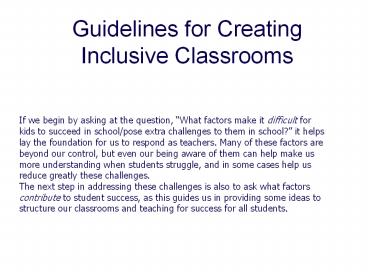Guidelines for Creating Inclusive Classrooms - PowerPoint PPT Presentation
1 / 10
Title:
Guidelines for Creating Inclusive Classrooms
Description:
Equity pedagogy: teach in ways that facilitate success of all Ss. ... Ss who are blind: markers that smell. Use different ways of learning ... – PowerPoint PPT presentation
Number of Views:25
Avg rating:3.0/5.0
Title: Guidelines for Creating Inclusive Classrooms
1
Guidelines for Creating Inclusive Classrooms
If we begin by asking at the question, What
factors make it difficult for kids to succeed in
school/pose extra challenges to them in school?
it helps lay the foundation for us to respond as
teachers. Many of these factors are beyond our
control, but even our being aware of them can
help make us more understanding when students
struggle, and in some cases help us reduce
greatly these challenges. The next step in
addressing these challenges is also to ask what
factors contribute to student success, as this
guides us in providing some ideas to structure
our classrooms and teaching for success for all
students.
2
Factors That Challenge
- Conflict in cultural beliefs practices
- Teacher assumptions about home
- Lack of access to resources
- Student outside commitments
- Abilities disabilities that are not understood
- Poverty issues
- Homelessness or unstable living circumstances
- Dysfunctional home life (abuse, alcoholism, drugs)
3
Success Factors
- Understanding of expectations
- Support from home based on 2-way understanding
- Help from home based on guidance from school
- Understanding adults who listen
- Home person attending functions
- Seeing self in school curric
- Universal design of school class
- Success opportunities to succeed
- Having ideas included
- Seeing connections to their lives
4
Dimensions of Multicultural Education (Banks,
1999)
- Content integration uses egs, data, info from
variety of cultures - Knowledge constructionhelp Ss understand how
knowledge is created influenced by culture,
race, ethnicity, social position of individuals
and gps - Prejudice reduction devel. ve relationships,
democratic tolerant attitudes toward others. - Equity pedagogy teach in ways that facilitate
success of all Ss. - Empowering school culture organization
practices
5
Universal Design
- The design of products and environments to be
used by all people, to the greatest extent
possible, without the need for adaptation or
specialized design.
6
Principles for Applying UID
- Create a welcoming classroom climate.
- Determine essential components
- Provide clear expectations and feedback
- Incorporate natural supports for learning
- Use multi modal instructional methods
- Provide for a variety of ways of demonstrating
knowledge - Use technology to enhance learning
- Encourage faculty-student contact
7
Applying UID
- Players Institution, faculty, students
- Classroom climate, technological supports,
natural supports - Issues Expression, expectations, engagement,
feedback
8
Adaptations
- ADHD - structure class so activity changes
- Phys Disab - arrangement of class (mobility)
- Prepare written materials ahead of time, possible
in caps or with caps alternative - Build success opportunities so Ss can shine or
can express through strengths - Ss who are blind markers that smell
- Use different ways of learning
- Different facilities adapt multiple facilities
9
Adaptations cont
- Slower pacing (strats that help teacher slow
down) - More visuals
- Art - for blind Ss - use texture, 3 D
- Have handouts with lecture outline - follow along
- Use of adaptive equipment or even playing field
by having all simulate .. - Hearing impairments connect to Ss interest (e.g.
math) - Hear see - -at same time larger font
10
Adaptations cont
- Students who work quickly, have back-up
assignments (sponges). - Hearing impaired speak enunciate well, face
the class (read lips) - Phys. disabilities -- let other students work
with SWD































